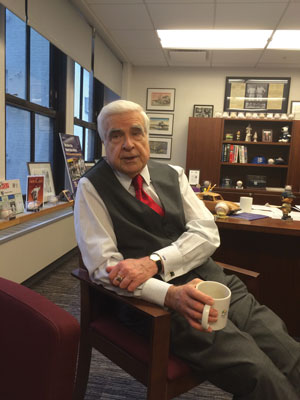We offered excerpts of my recent interview with legal scholar Arthur R. Miller last week (SportsBusiness Journal, May 11-17 issue).
I wasn’t very familiar with Miller’s work when pitched the idea, but I quickly became very interested after learning more of his background: Harvard Law professor, author, argued in front of the U.S. Supreme Court, was the personality behind such memorable characters as Professor Kingsfield from “The Paper Chase” and Professor Perini in Scott Turow’s “One L,” and counted Chief Justice John Roberts and MLB Commissioner Rob Manfred among his former students.
 |
“Today’s young people are no longer scared the way I was scared.”
|
My sit-down in his 4th floor office on 12th Street near the NYU campus was fascinating, as he walked me through his life in law and his legal philosophy. In going through the interview, I felt there were a number of interesting anecdotes that didn’t make it into last week’s feature, so here are a few other stories, in his own words:
“I went to the University of Rochester because my mother forbade me to become a lawyer. I became a debater after I dropped out of engineering and shifted over to history. Debating, which I did my last year of college, told me I had a voice. Most of my students, including Rob Manfred, would be amused by the notion that I was an introvert. I used to hide. Complete introvert, never volunteered, always tried to avoid being called on. Suddenly, debating, I said, ‘Wait, I’ve got a voice.’”
“In my half-century of teaching, I would say close to half the law students I encountered really can’t tell you why they went to law school. All I know is when I got to law school I fell in love with it. Why? It made me think. It made me see the legal system as an attempt to accommodate competing rights — landlord, tenant, etc. It struck me as interesting. It’s useful. I decided it’s the extent of the law that can resolve conflict, reach accommodation, strike balances from which public policy emerges, whether it’s by case decision or a statute. That was a good place to be.”
“When I got to Harvard, I was scared out of my mind. I tried to find the flunk rate. I never could. What changed was being pressured into looking at these conflicts as they appeared in the cases and saying, ‘The resolution of these conflicts, the rationality that the law tries to bring to bear, that’s nice.’ The first case in the torts book is about a bunch of hunters out in the woods chasing a fox, and one guy shoots and wounds the fox. Another guy grabs the fox. The cataclysmic question is, who owns the fox? Whose fox is it? At the most mundane level, that’s rights and conflict. Did I ever think in law school or the years I’ve practiced or most of the years I’ve taught that I’d apply that sort of mindset, that mode of thinking? That’s what law school does to you. It gives you a structure for thinking through problems.”
“When young people ask my advice about going into law school, I try to get them to focus on the question I never asked myself: ‘Why?’ For me, it was for want of anything other to do. But why are you interested? How do you think you might apply it? Are you into human rights? Are you into mergers and acquisitions?”
“Today’s young people are no longer scared the way I was scared and the way many of my students, from Minnesota and Michigan to Harvard, were scared. These days, students are more demanding. That’s this generation. They’re a hell of a lot more experienced and better educated than my generation or the early generations simply because the world is so open to them. They sit there with their computers in class, and it’s always amusing. I can say something like, ‘Geez, I don’t remember what year Jones vs. Smith was decided’ and some kid will say, ‘1948.’ It’s frightening in a way. They’re clearly smarter than I am.”
“Many of today’s sports commissioners have a legal background. Is it necessary? No. Advantageous? Yes, because of the analytics that are built into you and because lawyers tend to end up in organizations where their skill is not so much their familiarity with the law but their ability to assist in decision-making.”




